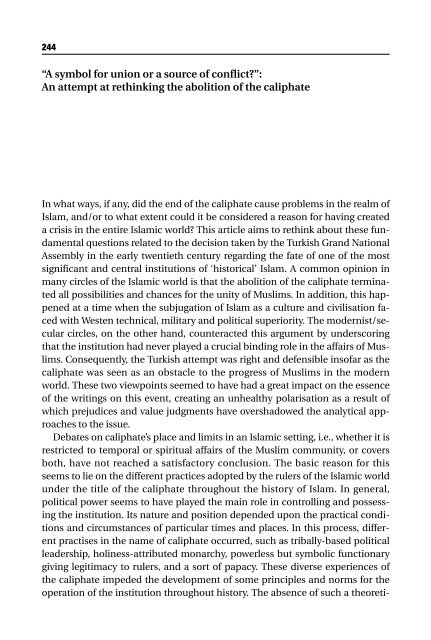Create successful ePaper yourself
Turn your PDF publications into a flip-book with our unique Google optimized e-Paper software.
244<br />
“A symbol for union or a source of conflict?”:<br />
An attempt at rethinking the abolition of the caliphate<br />
In what ways, if any, did the end of the caliphate cause problems in the realm of<br />
Islam, and/or to what extent could it be considered a reason for having created<br />
a crisis in the entire Islamic world? This article aims to rethink about these fundamental<br />
questions related to the decision taken by the Turkish Grand National<br />
Assembly in the early twentieth century regarding the fate of one of the most<br />
significant and central institutions of ‘historical’ Islam. A common opinion in<br />
many circles of the Islamic world is that the abolition of the caliphate terminated<br />
all possibilities and chances for the unity of Muslims. In addition, this happened<br />
at a time when the subjugation of Islam as a culture and civilisation faced<br />
with Westen technical, military and political superiority. The modernist/secular<br />
circles, on the other hand, counteracted this argument by underscoring<br />
that the institution had never played a crucial binding role in the affairs of Muslims.<br />
Consequently, the Turkish attempt was right and defensible insofar as the<br />
caliphate was seen as an obstacle to the progress of Muslims in the modern<br />
world. These two viewpoints seemed to have had a great impact on the essence<br />
of the writings on this event, creating an unhealthy polarisation as a result of<br />
which prejudices and value judgments have overshadowed the analytical approaches<br />
to the issue.<br />
Debates on caliphate’s place and limits in an Islamic setting, i.e., whether it is<br />
restricted to temporal or spiritual affairs of the Muslim community, or covers<br />
both, have not reached a satisfactory conclusion. The basic reason for this<br />
seems to lie on the different practices adopted by the rulers of the Islamic world<br />
under the title of the caliphate throughout the history of Islam. In general,<br />
political power seems to have played the main role in controlling and possessing<br />
the institution. Its nature and position depended upon the practical conditions<br />
and circumstances of particular times and places. In this process, different<br />
practises in the name of caliphate occurred, such as tribally-based political<br />
leadership, holiness-attributed monarchy, powerless but symbolic functionary<br />
giving legitimacy to rulers, and a sort of papacy. These diverse experiences of<br />
the caliphate impeded the development of some principles and norms for the<br />
operation of the institution throughout history. The absence of such a theoreti-


